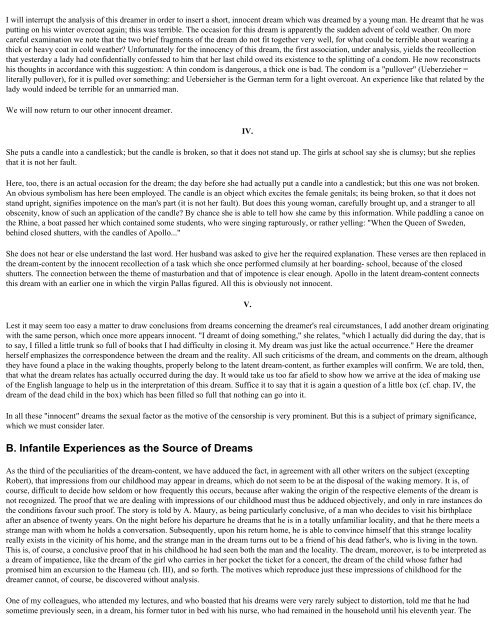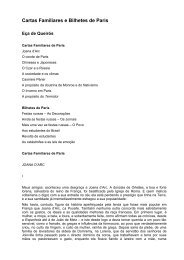The Interpretation of Dreams Sigmund Freud (1900)
The Interpretation of Dreams Sigmund Freud (1900)
The Interpretation of Dreams Sigmund Freud (1900)
You also want an ePaper? Increase the reach of your titles
YUMPU automatically turns print PDFs into web optimized ePapers that Google loves.
I will interrupt the analysis <strong>of</strong> this dreamer in order to insert a short, innocent dream which was dreamed by a young man. He dreamt that he was<br />
putting on his winter overcoat again; this was terrible. <strong>The</strong> occasion for this dream is apparently the sudden advent <strong>of</strong> cold weather. On more<br />
careful examination we note that the two brief fragments <strong>of</strong> the dream do not fit together very well, for what could be terrible about wearing a<br />
thick or heavy coat in cold weather? Unfortunately for the innocency <strong>of</strong> this dream, the first association, under analysis, yields the recollection<br />
that yesterday a lady had confidentially confessed to him that her last child owed its existence to the splitting <strong>of</strong> a condom. He now reconstructs<br />
his thoughts in accordance with this suggestion: A thin condom is dangerous, a thick one is bad. <strong>The</strong> condom is a "pullover" (Ueberzieher =<br />
literally pullover), for it is pulled over something: and Uebersieher is the German term for a light overcoat. An experience like that related by the<br />
lady would indeed be terrible for an unmarried man.<br />
We will now return to our other innocent dreamer.<br />
She puts a candle into a candlestick; but the candle is broken, so that it does not stand up. <strong>The</strong> girls at school say she is clumsy; but she replies<br />
that it is not her fault.<br />
IV.<br />
Here, too, there is an actual occasion for the dream; the day before she had actually put a candle into a candlestick; but this one was not broken.<br />
An obvious symbolism has here been employed. <strong>The</strong> candle is an object which excites the female genitals; its being broken, so that it does not<br />
stand upright, signifies impotence on the man's part (it is not her fault). But does this young woman, carefully brought up, and a stranger to all<br />
obscenity, know <strong>of</strong> such an application <strong>of</strong> the candle? By chance she is able to tell how she came by this information. While paddling a canoe on<br />
the Rhine, a boat passed her which contained some students, who were singing rapturously, or rather yelling: "When the Queen <strong>of</strong> Sweden,<br />
behind closed shutters, with the candles <strong>of</strong> Apollo..."<br />
She does not hear or else understand the last word. Her husband was asked to give her the required explanation. <strong>The</strong>se verses are then replaced in<br />
the dream-content by the innocent recollection <strong>of</strong> a task which she once performed clumsily at her boarding- school, because <strong>of</strong> the closed<br />
shutters. <strong>The</strong> connection between the theme <strong>of</strong> masturbation and that <strong>of</strong> impotence is clear enough. Apollo in the latent dream-content connects<br />
this dream with an earlier one in which the virgin Pallas figured. All this is obviously not innocent.<br />
V.<br />
Lest it may seem too easy a matter to draw conclusions from dreams concerning the dreamer's real circumstances, I add another dream originating<br />
with the same person, which once more appears innocent. "I dreamt <strong>of</strong> doing something," she relates, "which I actually did during the day, that is<br />
to say, I filled a little trunk so full <strong>of</strong> books that I had difficulty in closing it. My dream was just like the actual occurrence." Here the dreamer<br />
herself emphasizes the correspondence between the dream and the reality. All such criticisms <strong>of</strong> the dream, and comments on the dream, although<br />
they have found a place in the waking thoughts, properly belong to the latent dream-content, as further examples will confirm. We are told, then,<br />
that what the dream relates has actually occurred during the day. It would take us too far afield to show how we arrive at the idea <strong>of</strong> making use<br />
<strong>of</strong> the English language to help us in the interpretation <strong>of</strong> this dream. Suffice it to say that it is again a question <strong>of</strong> a little box (cf. chap. IV, the<br />
dream <strong>of</strong> the dead child in the box) which has been filled so full that nothing can go into it.<br />
In all these "innocent" dreams the sexual factor as the motive <strong>of</strong> the censorship is very prominent. But this is a subject <strong>of</strong> primary significance,<br />
which we must consider later.<br />
B. Infantile Experiences as the Source <strong>of</strong> <strong>Dreams</strong><br />
As the third <strong>of</strong> the peculiarities <strong>of</strong> the dream-content, we have adduced the fact, in agreement with all other writers on the subject (excepting<br />
Robert), that impressions from our childhood may appear in dreams, which do not seem to be at the disposal <strong>of</strong> the waking memory. It is, <strong>of</strong><br />
course, difficult to decide how seldom or how frequently this occurs, because after waking the origin <strong>of</strong> the respective elements <strong>of</strong> the dream is<br />
not recognized. <strong>The</strong> pro<strong>of</strong> that we are dealing with impressions <strong>of</strong> our childhood must thus be adduced objectively, and only in rare instances do<br />
the conditions favour such pro<strong>of</strong>. <strong>The</strong> story is told by A. Maury, as being particularly conclusive, <strong>of</strong> a man who decides to visit his birthplace<br />
after an absence <strong>of</strong> twenty years. On the night before his departure he dreams that he is in a totally unfamiliar locality, and that he there meets a<br />
strange man with whom he holds a conversation. Subsequently, upon his return home, he is able to convince himself that this strange locality<br />
really exists in the vicinity <strong>of</strong> his home, and the strange man in the dream turns out to be a friend <strong>of</strong> his dead father's, who is living in the town.<br />
This is, <strong>of</strong> course, a conclusive pro<strong>of</strong> that in his childhood he had seen both the man and the locality. <strong>The</strong> dream, moreover, is to be interpreted as<br />
a dream <strong>of</strong> impatience, like the dream <strong>of</strong> the girl who carries in her pocket the ticket for a concert, the dream <strong>of</strong> the child whose father had<br />
promised him an excursion to the Hameau (ch. III), and so forth. <strong>The</strong> motives which reproduce just these impressions <strong>of</strong> childhood for the<br />
dreamer cannot, <strong>of</strong> course, be discovered without analysis.<br />
One <strong>of</strong> my colleagues, who attended my lectures, and who boasted that his dreams were very rarely subject to distortion, told me that he had<br />
sometime previously seen, in a dream, his former tutor in bed with his nurse, who had remained in the household until his eleventh year. <strong>The</strong>









